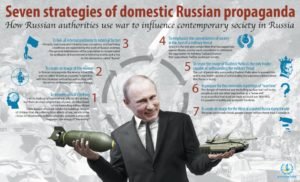
Hewlett
Civic education can be a vital antidote to disinformation, observers suggest. For a new generation of young Americans, “civics class has come to them,” notes New York Times columnist Timothy Egan, forcing them “to learn how to use the tools of democracy that were largely denied them by passive educators,” he writes:
It’s no secret that in the rush to produce adults who are adept at applying science and technology to modern life, we left them ill-trained in the basic duties of citizenship. Nearly a third of Americans cannot name a single branch of government, and almost 40 percent are unable to cite a right guaranteed by the First Amendment.
Critical thinking has arrived at a critical time, he adds.

DFRLab
Nearly three years after a Russian propaganda group infiltrated Facebook and other tech platforms in hopes of seeding chaos in the 2016 US election, Facebook has more fully detailed its plan to protect elections around the world. These approaches are promising, but far from comprehensive, WIRED adds:
The company has historically done little to prevent its users’ data from falling into the wrong hands. That valuable information can be used to target people in ways that Facebook has no control over. Perhaps the most worrisome part of Facebook’s plan to defend democracy, though, is that it has yet to be battle tested.
In its propaganda, the Putin regime has mastered a striking combination of ideology and cynicism, or, more precisely, cynicism elevated to the rank of ideology, says Russian journalist Kseniya Kirillova. Its propaganda plays on a wide variety of sensations, skillfully reducing them all to the desired result, she writes for Euromaidan Press, summarizing the human instincts to which it appeals:
 First and foremost, Russian propaganda engages in fear-mongering to create an image of Russia surrounded by enemies who are eager to see its complete destruction. The strongest image here is of a future catastrophe – chaos and looting in the streets, destitution, bombs falling from above, dead children, and destroyed houses. Television plunges viewers into an illusory hell, and the only way out of it is unification around the national leader…..
First and foremost, Russian propaganda engages in fear-mongering to create an image of Russia surrounded by enemies who are eager to see its complete destruction. The strongest image here is of a future catastrophe – chaos and looting in the streets, destitution, bombs falling from above, dead children, and destroyed houses. Television plunges viewers into an illusory hell, and the only way out of it is unification around the national leader…..
- Appeal to the group instinct or, on the contrary, individual “elitism.” Even though they seem to be opposites, they are based on the same psychological need – the desire to feel a part of something that is undeniably good. …. The main feeling here is a sense of community and involvement. This social instinct is not inherently something negative, but it is always skillfully used in negative ways by totalitarian regimes.
- Cynicism and cruelty, aroused by propaganda, already has a clearly expressed moral dimension, because it plays on the worst instincts of human nature, and is a manifestation of deliberate cruelty…. but also the phenomenon that some years ago I described as “ideological cynicism” – a creature of the Putin regime. ….
 Putin’s international strategy reflects his domestic goals, argues Regina Smyth, Associate Professor of Political Science at Indiana University.
Putin’s international strategy reflects his domestic goals, argues Regina Smyth, Associate Professor of Political Science at Indiana University.
The Kremlin creates new alliances with like-minded rulers who hold absolute power like Recep Tayyip Erdogan in Turkey and Bashar Assad in Syria, using tactics such as social media control and the spread of propaganda to shape social support. It is a foreign policy based on aggressive disruption and disinformation, she writes for The Conversation.







